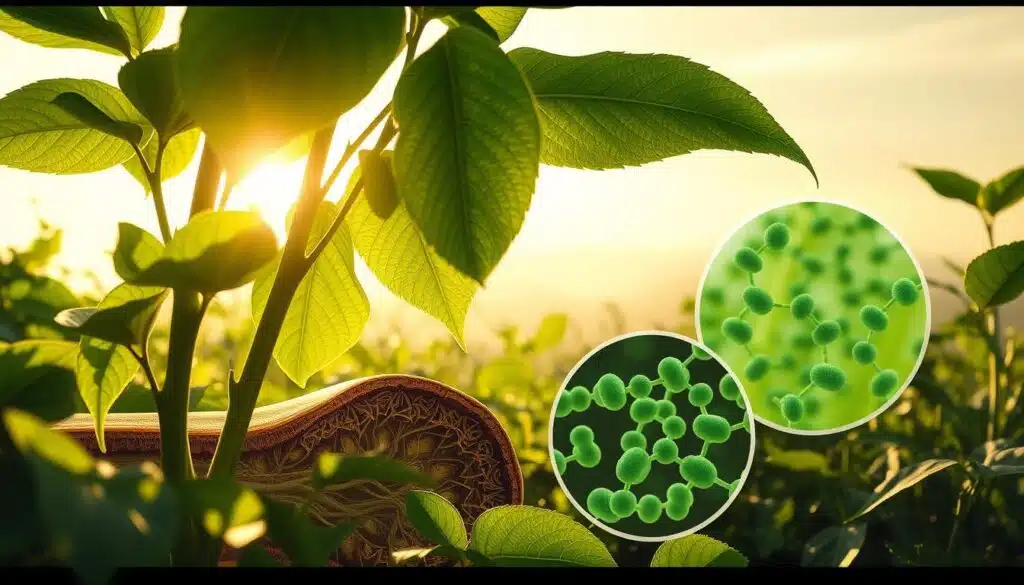Getting your plants to grow well is a big goal for gardeners, farmers, and those who love plants. It’s important to know what different plants need and to use good gardening tips. Using tips from experts can make a big difference in your garden’s health and how well your plants do. We’ll look at key things that make plants grow better, making your gardening better and your plants happier.
Understanding the Basics of Photosynthesis
Photosynthesis is a vital process for plants. It turns sunlight, carbon dioxide, and water into glucose and oxygen. This amazing change happens in the leaves’ mesophyll cells, rich in chloroplasts. There, chlorophyll captures sunlight. This starts the creation of carbohydrates.
Anúncios
The process can be shown as 6 CO2 + 6 H2O + Energy → C6H12O6 + 6 O2. This shows how key parts make sugars that feed plants. Understanding photosynthesis helps gardeners with plants’ light needs. This leads to healthy plants.
It’s important to control plant functions like respiration and transpiration. Knowing about photosynthesis improves care methods. This can make gardens more beautiful.
Anúncios

Essential Factors Influencing Plant Growth
There are several important factors that affect how plants grow. These factors are critical for their health and growth. Light is one of the top things they need. It lets plants change sunlight into energy through photosynthesis.
Water is also key, not just for photosynthesis but for moving nutrients around the plant. If plants don’t get enough water, they can’t take up nutrients well. This can stunt their growth and harm their health.
Temperature greatly affects plant growth too. Each plant has its own temperature needs for its metabolism. Too much heat or cold can slow down their growth. So, it’s crucial to keep the right temperature for plants to grow well.
For strong plant growth, you must balance light, water, and temperature. They all work together to make a good environment for plants to grow healthy.
Maximize Plant Growth through Proper Watering Techniques
Effective watering methods are key for healthy plants. They need a certain level of moisture to grow well. It’s important for those who garden to know how much is just right. Too much water causes root rot, and too little leads to dryness and poor growth.
Checking the soil’s moisture regularly is needed. Using tools like moisture meters is a smart move. They show when it’s time to water. Using systems like drip irrigation gets water right to the roots without waste. This way, plants get the water they need efficiently.
Remember, different plants need different amounts of water. It depends on the humidity, temperature, and the plant type. Certain plants do better with lots of water, while others like it drier. Changing how often you water, based on these things, helps plants get just what they need to thrive.
Light Requirements for Optimal Plant Growth
It’s important to know how much light different plants need to grow strong and bloom. Each plant has its own sunlight needs. Some do best in bright, indirect light, while others need full sun or just a bit of shade.
Grow lights can be a big help for plants indoors, especially when there’s not much sunlight. Picking the right grow light and placing it well matters a lot. It makes sure the plants get enough light.
Keeping an eye on how much light a plant gets is key to good photosynthesis. This leads to healthy growth and more produce. So, understanding light needs is crucial for garden success.
Soil Health: The Foundation of Robust Plant Growth
Soil health is key for strong plant growth. It gives plants the nutrients they need and supports their roots. Keeping soil healthy means balancing pH levels, adding organic stuff, and managing water.
Testing soil helps find what nutrients are missing. This lets gardeners use the right fertilizers or organic materials. By focusing on soil health, plants get the best food for better growth and health.
Healthy soil holds more water and supports living organisms. This creates a great place for plants to grow. Improving soil not only helps plants now but also prepares for future growth.
Nutrients and Fertilizers: Boosting Plant Growth
To get the best plant growth, knowing about nutrients and fertilizers is key. Plants need both big and small nutrients to do well. Big nutrients like nitrogen, phosphorus, and potassium help with things like making food through photosynthesis and growing cells. Small nutrients, such as iron and manganese, are critical for enzymes to work right and for the plant’s overall health.
Macro and Micronutrients Essential for Growth
Each nutrient, both big and small, plays a special role in helping plants grow. Nitrogen is key for green leaves, while phosphorus is important for strong roots and flowers. Potassium makes sure plants use water well and stay healthy. Even in tiny amounts, small nutrients are just as crucial to stop problems that can stop plants from growing right.
Strategies for Fertilizer Application
The right way to use fertilizers means plants get more from their food and grow better at each stage. It’s smart to match fertilizer with the plant’s growth stage to make sure they get what they need when they need it. Here are some tips to follow:
- Put fertilizers on when plants are growing a lot and need more food.
- Stick to guidelines to avoid giving too much and to make sure plants get the right amount.
- Choose slow-release fertilizers so plants get a steady stream of nutrients over time.
- Don’t fertilize right before it rains a lot to keep nutrients from washing away and to keep our water clean.
By really getting both the big and small nutrients and using smart fertilizer methods, anyone growing plants can make them grow better and healthier.
Temperature and Its Impact on Plant Growth
Temperature is key in plant growth. It affects how fast plants grow and their health. Most plants do best in temperatures between 65°F and 85°F. If it gets too cold or too hot, plants might not grow well. They can have trouble blooming and fighting off sickness and bugs.
It’s important to keep the right temperature for plants to grow strong. Here’s what you need to do:
- Know the perfect temperature for your plants
- Use thermometers to watch the temperature
- Use heaters or coolers in places like greenhouses
- Remember, the time of year can change things for your plants
By controlling the temperature, gardeners can make the best growing spot for their plants. This means plants will be healthier and produce more. Paying attention to temperature helps in getting a great harvest.
Pruning and Training Techniques for Enhanced Growth
Learning how to prune and train plants properly can really help them thrive. By pruning, you get rid of dead or too many branches. This boosts air flow and lets more light reach the plant. It’s key for healthy growth and getting more fruit or flowers.
Effective Pruning Methods to Maximize Yield
To get the best out of pruning, here are some tips:
- Remove dead or diseased branches to stop sickness from spreading.
- Thinning out areas with too many branches helps air move better and fights for light less.
- Cut back too much growth so the stronger branches can do better.
Training Systems to Support Healthy Development
Training plants is about directing their growth for more sunlight and less damage. Try these ideas:
- Use stakes to keep tall plants from tumbling over.
- Use trellises for climbing plants to grow upwards.
- Put cages around plants that need help standing as they grow.
Conclusion
To make plants grow better, you need a plan that covers many important steps. It’s key to know how plants make their food, and how crucial light, good soil, nutrients, and the right temperature are. Each one greatly helps plants grow well.
By using the tips shared in this article, you can really boost how well your garden does. Paying close attention to how you water and trim your plants helps their health and growth too. Knowing all this well leads to really great gardens.
Trying out these different methods will make your garden look better and produce more. With the best gardening advice, anyone can make their garden outstanding. Good gardening helps our environment too, by creating healthy places that help everyone.
FAQ
What is photosynthesis and why is it important for plant growth?
How does light intensity affect plant growth?
What watering techniques should I use to maximize plant health?
Why is soil health important for maximizing plant growth?
What are the key macronutrients and micronutrients required for plants?
How can temperature influence plant growth?
What are effective pruning techniques to support plant growth?
How can I effectively use fertilizers to boost plant growth?
Content created with the help of Artificial Intelligence.



